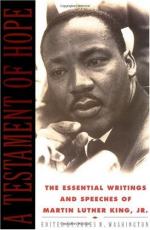|
This section contains 790 words (approx. 2 pages at 400 words per page) |

|
A Testament of Hope: The Essential Writings and Speeches of Martin Luther King, Jr Summary & Study Guide Description
A Testament of Hope: The Essential Writings and Speeches of Martin Luther King, Jr Summary & Study Guide includes comprehensive information and analysis to help you understand the book. This study guide contains the following sections:
This detailed literature summary also contains Topics for Discussion and a Free Quiz on A Testament of Hope: The Essential Writings and Speeches of Martin Luther King, Jr by Martin Luther King, Jr..
A Testament of Hope: The Essential Writings and Speeches of Martin Luther King, Jr. is a compilation of writings and speeches from the life of Martin Luther King from his rise to prominence during the 1956 Birmingham, Alabama, bus boycott to an interview given just ten days before his assassination in 1968 and articles published shortly after. Included in this book are a portion of Dr. King's sermons, speeches, and writings supporting his strong beliefs that nonviolent active protest is the only safe way in which the Negro people could gain the civil rights promised them in the Emancipation Proclamation of 1864. Though that proclamation gave freedom from physical ownership of the body, the Negroes still suffered from economical and social segregation, humiliation, subservience and oppression. When the Supreme Court ruled against the Separate but Equal doctrine that had upheld the Jim Crow laws of the South in 1954, Negroes believed that their time for true freedom had come. Leaders of the South refused to comply with the law, and nothing changed until one winter evening when a tired Rosa Parks refused to give up her seat on the Montgomery Bus Line to a white man. Her subsequent arrest precipitated the yearlong boycott by Negro riders who finally forced the buses to integrate. Later protest actions enabled Negroes across the South to register to vote, to insist on fair employment and promotion standards, as well as other civil rights.
Dr. King willingly participated as a committee member for the original bus boycott. Unexpectedly called on to be Chairman early in the campaign, he continued the struggle for civil rights for the rest of his life. As a minister, Dr. King determined that this protest should be a peaceful, nonviolent action, driven by love rather than hate. It was pointed out that this was similar to the actions of Gandhi. A study of Gandhi's strategies led to a Christian version of nonviolent protest actions which eventually forced federal and state governments to recognize the rights. The Southern Christian Leadership Conference (SCLC), elected Dr. King president, and directed the movement.
Much of the book reiterates similar ideas, philosophy, and purposes supporting nonviolent action. In many ways, this becomes redundant and repetitive. Some early chapters are portions of later included books, while none of King's books are included in total. The book gives an excellent feel for the state of mind and the efforts of Dr. King. However, it becomes overdone, almost boring with the constant restating of major points. Recognizably, Dr. King was required to repeat his speeches many times, with slight changes as he shared his philosophy many times. However, this book often exactly repeats portions of the philosophy, and same speeches. Additionally, as the books are included at the end of the book, excerpts from these books give a sense of an attempt to achieve a certain number of pages, rather than a clear, concise, use of specific speeches and articles that complete the understanding of the man without overwhelming the reader with words.
Another issue with this edition is in the front notes added by the editor. Some comments and quotes are not included in the actual article. This leads the reader to wonder what has been left out, and if the information included provides only a positive image of Dr. King, rather than a well-rounded view of the man, problems and all. This particular edition leads one to think that Dr. King was a prophet of God, a mighty connector of peoples, and a near perfect man. Though he may have been much of this, the lack of negative images leads one to wonder what has been left out that would better give one a complete picture of this man.
Dr. Martin Luther King was an extremely logical, persuasive and eloquent speaker and writer. His arguments are clear and well presented. One wonders how the world would have changed had he not been assassinated, how his influence on the leaders of the United States and the common man would have changed the history of the United States. It is easy to be captured by his logic and accept his arguments. Other than the overuse of similar selections, this is a well-done, collection of the writings of an important historical figure.
The book is considered "essential writings" and the editor obviously was required to omit interesting portions of Dr. King's writings. This must have been an overwhelming project, and the editor is to be congratulated on his efforts. However, some of the included chapters could well have been eliminated, or shortened. If the books were considered essential, they eould have done better to cover the essential ideas and ideals of Dr. King without the redundancy of the early chapters.
Read more from the Study Guide
|
This section contains 790 words (approx. 2 pages at 400 words per page) |

|



